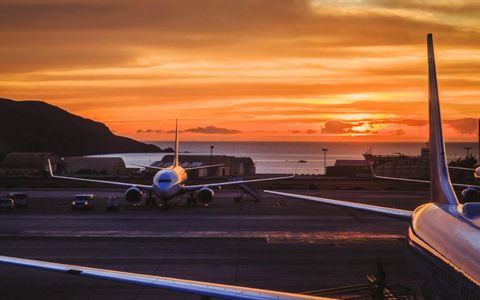Is 5G A Problem For Airplanes? Airlines Say It Is & They're Fighting Back
5G C-Band rolls out soon, and airlines are warning of potentially catastrophic disruptions with thousands of canceled flights and shipping delays.
The next phase of the 5G rollout is set to begin on Jan. 19, 2021, but major airlines are still not satisfied that critical flight equipment won't be affected. In fact, airlines claim massive disruption is imminent, with thousands of flights potentially being canceled, and shipping might be significantly delayed if 5G C-Band is allowed to operate close to airports.
5G technology keeps promising to transform connectivity, and to some degree, it has. However, it is only marginally faster than the 4G LTE standard in most cases. The transformative speeds expected are arriving very slowly and in limited areas. There are several reasons 5G expansion takes time. In part, the pandemic has impacted the scheduling of almost everything worldwide, delaying construction projects and the behind-the-scenes work. Regulatory approval to use new frequencies plays a role in the timing. Finally, there has been an ongoing battle between cellular carriers and airlines regarding a specific range of frequencies known as C-Band.
The Guardian reports that a letter received by U.S. regulators on Monday from Airlines for America warned that travel and shipping could suffer catastrophic disruptions if the new C-Band frequencies are allowed to be used within two miles of aircraft. The letter was signed by chief executives from American Airlines, Delta Air Lines, United Airlines, Southwest Airlines and Jet Blue. Freight carriers UPS and FedEx also signed, making a cadre of top airlines facing off against two leading wireless carriers, Verizon and AT&T. The letter is hoping to stop the next phase of the 5G rollout, which begins on Wednesday, Jan. 19.
Is 5G A Problem For Airplanes?
The new 5G C-Band frequencies are already in use by some aviation equipment. That's why a group of airlines is demanding a two-mile buffer around runways to prevent the danger of malfunctioning altimeters and other equipment. Wireless carriers have discounted the risk, and the FAA (Federal Aviation Administration) agrees that the impact should be minimal. The FAA has cleared about 45-percent of commercial airplanes in the U.S. to handle low-visibility landings at airports that might be affected by 5G C-Band signals.
This issue has been dragging on for months, with carriers insisting that it isn't a problem and airlines disagreeing. The FAA has analyzed the concerns and sided with Verizon and AT&T, setting a Jan. 19, 2021 start date, allowing a little more time for the airlines to provide evidence of a problem. Unfortunately, nothing has swayed opinions on either side, and 5G C-Band will be available on Wednesday unless something changes immediately.





Post a Comment